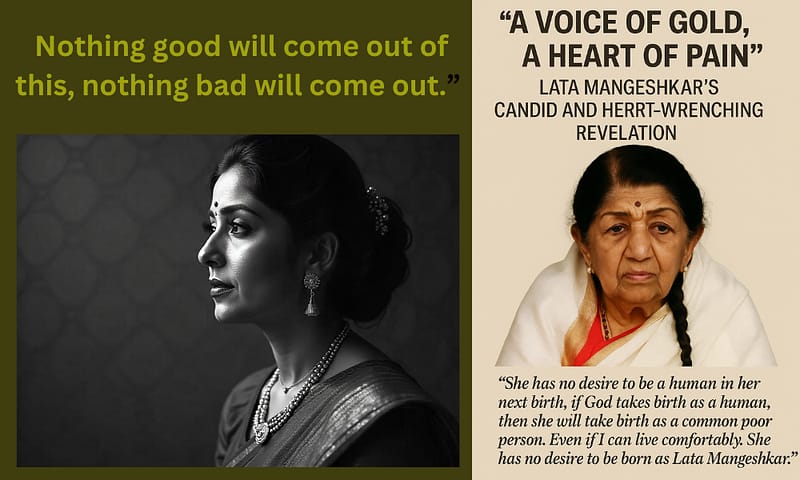A Voice of Gold, A Heart of Pain”: Lata Mangeshkar’s Candid and Heart-Wrenching Revelation
A Voice of Gold, A Heart of Pain”: Lata Mangeshkar’s Candid and Heart-Wrenching Revelation
The late Lata Mangeshkar, India’s most famous and cherished playback singer, talked candidly about the emotional toll of her remarkable career in a rare and intense interview. Lataji, also referred to as the Nightingale of India, was always a lady of grace, modesty, and commitment. However, beneath the millions of songs and classic tunes that adorned Indian film for almost 80 years was a human tale of loneliness, sacrifice, and a desire that even prosperity could not satiate.
Lata Mangeshkar made a very poignant statement in this interview that has since gone viral and moved people all around the world, sparking intense conversations about the cost of celebrity. Her writings were a profound commentary on life, fate, and identity in addition to reflecting her own personal suffering.
“She had to work so much… But I never made her rich with this thing.”
Everyone was taken aback by this one line, which was quiet but full of passion. She seemed to discuss herself in the third person, almost as a detached observer—“She had to labour so much.” It reflects the enormous amount of work she put into her career, but it also conveys a deeper regret: in spite of the fame, she never permitted herself to become “rich” in the ways that were actually important, such as in terms of inner peace, spirituality, or emotions.
Lata Mangeshkar began her career when other kids were still playing. She assumed responsibility for providing for her family after her father passed away by using her God-given gift of music. Her thoughts constantly drew her towards duty rather than comfort, so even if the world showered her with praise, she suggests that she denied herself a sense of fulfillment—possibly a sense of peace or relaxation.
“I listen to my mind… Whatever is supposed to happen in life happens.”
Lataji described how she always followed her thoughts and never her wants with stoic resignation. In addition to revealing a worldview based on acceptance and surrender, this sentence also reveals a hint of internal turmoil. Did anyone ever hear her heart? Or did duty and discipline always suppress it?
Her statement serves as a reminder that every national asset is a human being who may have sacrificed their own pleasures so that others could enjoy their creativity in a society that frequently praises sacrifice.
“Nothing good will come out of this, nothing bad will come out.”
Lataji appears to be discussing the pointlessness of making predictions about fate or the results of decisions in this passage. Despite its ambiguity, this statement seems to express a sense of fatigue with life’s unpredictable nature. The realisation that no matter how much one provides, the world won’t change and that one rarely has influence over the results is nearly akin to a spiritual detachment.
“She has no desire to be a human in her next birth…”
This is arguably the most eerie statement she made during the entire interview. The voice of Indian cinema’s soul, Lata Mangeshkar, publicly declared that she did not want to be human in her next life. It’s a sad and profoundly intellectual notion that expresses disenchantment with the human condition.
She continued by saying that she would rather be “a common poor person,” someone who could live quietly in anonymity, even if she had to be reborn as a human. Not as the global hero, not as Lata Mangeshkar.
The extreme pressure, lack of privacy, and emotional exhaustion that frequently accompany celebrity are exposed in this statement. She yearned for the peaceful existence of an anonymous person, free from expectations, even though she was loved by millions.
A Legacy Beyond Words
Lata Mangeshkar devoted her time, youth, personal life, and ultimately her identity to her music. Although her songs have endured for years, this conversation makes us face the unsettling reality that even legendary people can experience loneliness, unhappiness, and exhaustion.
Her candour is both illuminating and devastating. It forces us to consider how much greatness costs as well as how our culture defines success. Is it in accolades and cheers? Or in harmony, tranquilly, and the capacity to live only for oneself?






